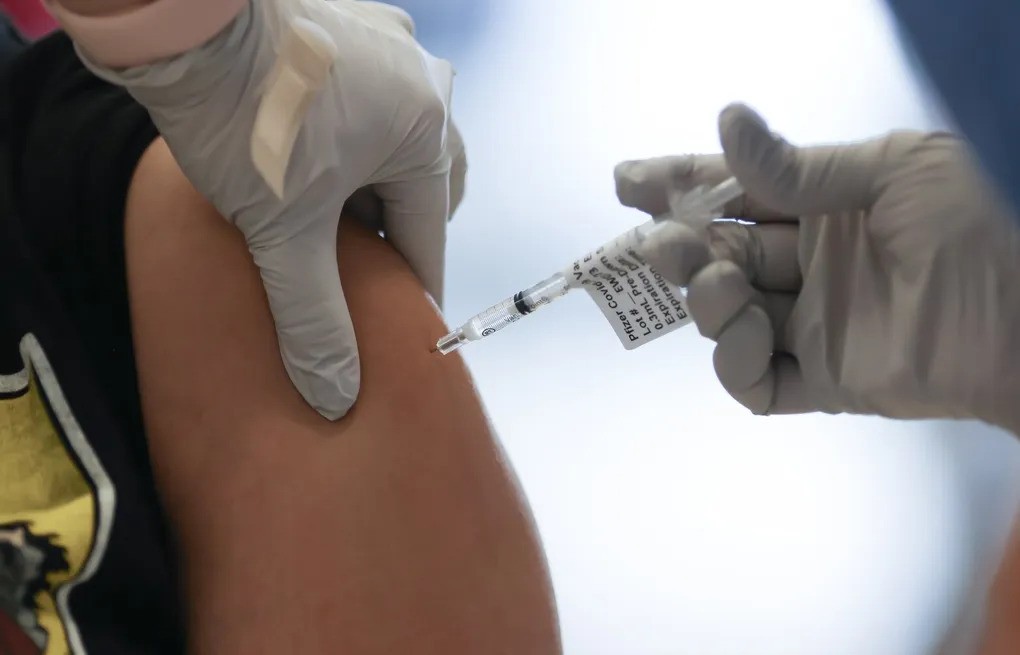German Man Deliberately Receives Covid Vaccination 217 Times
German man deliberately receives Covid vaccination 217 times, truly embracing the concept of being on a mission. Over 29 months, the 62-year-old man from Magdeburg received the Covid-19 vaccine shots, defying national vaccine recommendations.
Author:Karan EmeryReviewer:Daniel JamesMar 07, 202464.8K Shares864.5K Views

German man deliberately receives Covid vaccination 217 times, truly embracing the concept of being on a mission. Over 29 months, the 62-year-old man from Magdeburg received the Covid-19 vaccine shots, defying national vaccine recommendations. That averages out to roughly one shot every four days.
In doing so, he became a unique case study for understanding the effects of repeated vaccination against the same pathogen on the immune system. A report published in the Lancet Infectious Diseases journal detailed his case, revealing that his "hypervaccination" didn't lead to any adverse health outcomes. However, it also didn't notably enhance or deteriorate his immune response.
Though the man remains unnamed in the correspondence, as per German privacy regulations, the study confirms 134 of his shots through official documentation from vaccination centers and legal authorities. The remaining 83 shots were self-reported.
"This is a really unusual case of someone receiving that many Covid vaccines, clearly not following any type of guidelines," said Dr. Emily Happy Miller, an assistant professor of medicine and of microbiology and immunology at Albert Einstein College of Medicine who did not participate in the research.
The man didn't experience any vaccine-related side effects and hasn't contracted Covid-19 so far. This is supported by frequent antigen and PCR tests conducted between May 2022 and November 2023. However, researchers warn that it's uncertain whether his Covid-free status is directly attributed to his hypervaccination routine.
“„Perhaps he didn't get Covid because he was well-protected in the first three doses of the vaccine. We also don't know anything about his behaviors.- Dr. Emily Happy Miller
Dr. Kilian Schober, the senior author of the recent study and a researcher at Friedrich-Alexander University Erlangen-Nürnberg, emphasized that this is a unique case study, and its findings shouldn't be applied broadly. Furthermore, the researchers explicitly state that they do not support hypervaccination as a means to boost immunity.
"The benefit is not much bigger if you get vaccinated three times or 200 times," Schober said.
Raising Suspicions
Based on his vaccination records, the man received his initial Covid vaccine in June 2021. Throughout that year, he received 16 shots at various centers in the eastern state of Saxony. His vaccination efforts escalated in 2022. In January alone, he received shots almost daily, alternating between his right and left arms, tallying up to 48 shots that month.
He continued this pattern with 34 shots in February and six more in March. At this point, staff members from the German Red Cross in Dresden grew suspicious and issued a warning to other vaccination centers, advising them to alert the police if the man appeared again.
In early March, he arrived at a vaccination center in the town of Eilenburg and was apprehended by police. Allegedly, he was under suspicion of selling vaccination cards to third parties, as reported by RTL. This occurred during a period when numerous European nations mandated proof of vaccination for entry into public venues and travel.
The public prosecutor in Magdeburg initiated an inquiry into the man for allegedly distributing vaccination cards without authorization and falsifying documents. However, according to the study, criminal charges were not ultimately filed against him.
Effects Of Hypervaccination
Upon learning about the man through news reports, the researchers contacted him via the prosecutor handling his case in May 2022. At that time, he had already received 213 shots. Despite the researchers' medical advice against it, he agreed to share medical information and provide blood and saliva samples. Additionally, he continued to receive four more Covid shots.
The researchers examined his blood chemistry and found no abnormalities associated with his hypervaccination. They also assessed various markers to gauge the functionality of his adaptive immune system. Miller explained that the adaptive immune system, which learns to identify and respond to specific pathogens encountered throughout life, consists mainly of two cell types: T cells and B cells.
Schober noted that in chronic diseases like HIV and hepatitis B, immune cells may become exhausted due to repeated exposure to the pathogen, leading to a diminished ability to fight it off effectively. Theoretically, hypervaccination could produce a similar outcome.
However, the researchers' findings contradicted this expectation. In this instance, hypervaccination led to an increase in quantity (the number of T cells and B cell products) without compromising the quality of the adaptive immune system, as stated in the study.
"If you take the allegory of the immune system as an army, the number of soldiers is higher, but the soldiers themselves are not different," Schober said.
Altogether, the man received eight different types of vaccines, which included mRNA vaccines from Pfizer/BioNTech and Moderna, a vector-based vaccine from Johnson & Johnson, and a recombinant-protein vaccine from Sanofi.
"The observation that no noticeable side effects were triggered in spite of this extraordinary hypervaccination indicates that the drugs have a good degree of tolerability," Schober said in a news release.
Miller emphasized that while individual case studies like this one are fascinating from a scientific standpoint, they should be approached with caution. She stressed that for guidance, people should rely on public health recommendations, which are derived from extensive, large-scale randomized controlled trials.
“„I don't think any physician or public health official would recommend doing what this gentleman did. This is really uncharted territory. Talk to your doctor, follow the recommended vaccine schedules, and that should be the best thing to keep you both protected from Covid and healthy and safe.- Dr. Emily Happy Miller
The US Centers for Disease Control and Prevention (CDC) advises Covid vaccination for all individuals aged 6 months and older in the United States, adhering to the vaccination schedules provided on its website. Recently, the CDC revised its guidance to recommend an extra dose of the current Covid vaccine for individuals aged 65 and above. According to CDC data, fewer than a quarter of adults and only 13% of children in the US have received the latest Covid vaccine recommended.

Karan Emery
Author
Karan Emery, an accomplished researcher and leader in health sciences, biotechnology, and pharmaceuticals, brings over two decades of experience to the table. Holding a Ph.D. in Pharmaceutical Sciences from Stanford University, Karan's credentials underscore her authority in the field.
With a track record of groundbreaking research and numerous peer-reviewed publications in prestigious journals, Karan's expertise is widely recognized in the scientific community.
Her writing style is characterized by its clarity and meticulous attention to detail, making complex scientific concepts accessible to a broad audience. Apart from her professional endeavors, Karan enjoys cooking, learning about different cultures and languages, watching documentaries, and visiting historical landmarks.
Committed to advancing knowledge and improving health outcomes, Karan Emery continues to make significant contributions to the fields of health, biotechnology, and pharmaceuticals.

Daniel James
Reviewer
Daniel James is a distinguished gerontologist, author, and professional coach known for his expertise in health and aging.
With degrees from Georgia Tech and UCLA, including a diploma in gerontology from the University of Boston, Daniel brings over 15 years of experience to his work.
His credentials also include a Professional Coaching Certification, enhancing his credibility in personal development and well-being.
In his free time, Daniel is an avid runner and tennis player, passionate about fitness, wellness, and staying active.
His commitment to improving lives through health education and coaching reflects his passion and dedication in both professional and personal endeavors.
Latest Articles
Popular Articles
